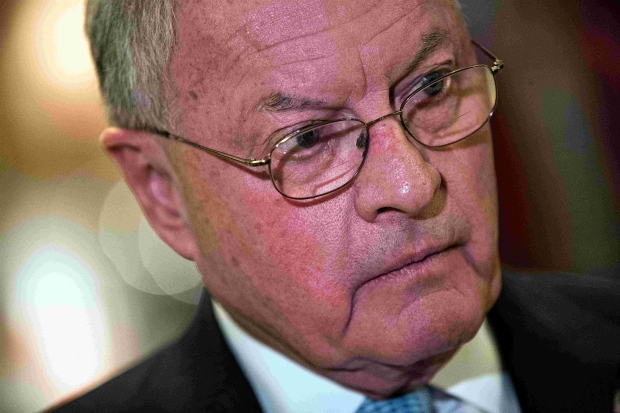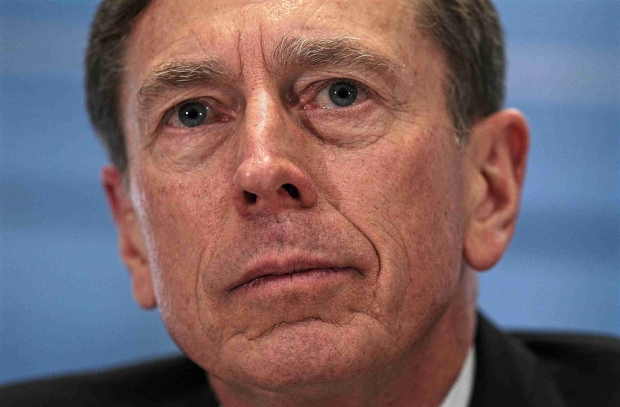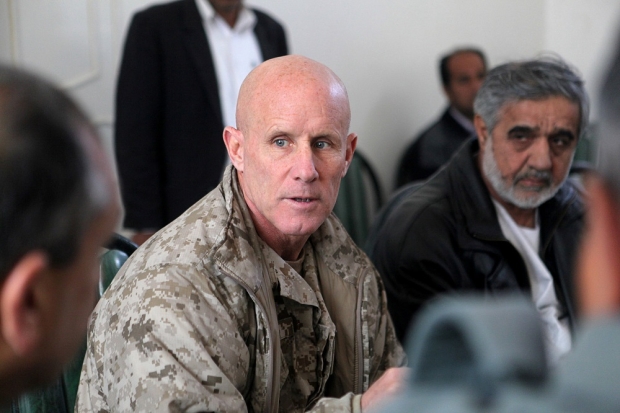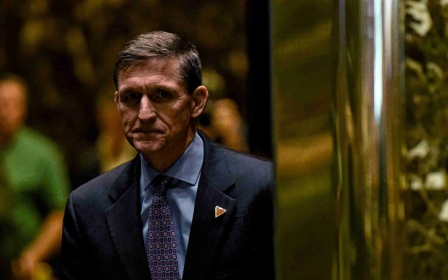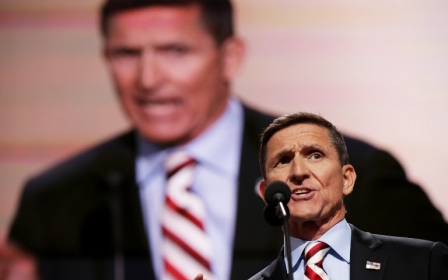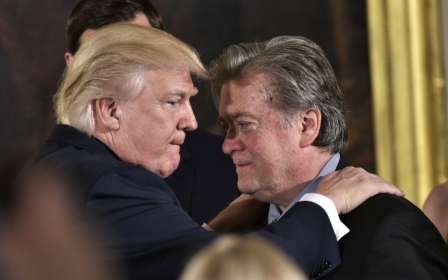Trump eyes Petraeus, Harward, Kellogg to replace Flynn as security adviser
Michael Flynn’s departure as White House national security adviser after less than a month on the job is a major setback for the Donald Trump White House.
Flynn’s endorsement of Trump during the early stages of the presidential campaign was considered a vote of confidence from a retired three-star general for a candidate who had virtually no government experience.
Trump rewarded Flynn for his early loyalty with the national security adviser post, one of any administration's most critical jobs, helping shape national security and foreign policy priorities.
The White House asked for Flynn's resignation after he "eroded" trust with Trump and Vice President Mike Pence for concealing the truth about discussing sanctions in a call with the Russian ambassador while President Barack Obama was still in office.
Trump has asked Lieutenant General Keith Kellogg to fill in Flynn's spot in the meantime. Three candidates, including Kellogg, have so far emerged as a possible replacement.
Retired Lieutenant General Keith Kellogg
According to Robert Grenier, former director of the CIA’s Counter-Terrorism Center, Kellogg "has been out of the game for a while," working in the corporate world, which makes him an unlikely replacement for Flynn.But he has been a supporter and confidant of Trump, and would easily pass a loyalty check for the administration.
Critics point to his role in the Iraq war, which Trump has repeatedly called disastrous. Kellogg, a Vietnam veteran, was the director of operations of the Coalition Provisional Authority, which ruled Iraq and dissolved the Iraqi army in 2003 following the US invasion.
READ: Trump's Valentine: From the White House to IS, with love
During the presidential campaign, he defended Trump’s policy proposal on how to retake Mosul from the Islamic State (IS) group in a Fox News column, which included potshots against the Obama administration's handling of the military offensive.
"The Obama administration shows poor judgment in launching the Mosul offensive without planning for the day after military operations are complete, nor who will ultimately control Iraq’s second largest city," wrote Kellogg in a column he co-authored with Flynn in October. "The problem in Iraq is political; it always has been and cannot be solved through military means alone."
'The problem in Iraq is political; it always has been and cannot be solved through military means alone'
- Keith Kellogg and Michael Flynn
The pair also faulted Obama for announcing the Mosul offensive in advance, echoing Trump’s criticism about the “element of surprise”.
The two retired generals also warned against Iran’s growing influence in the region, pointing the finger at Obama and Hillary Clinton for “poor leadership”.
“Under the Obama/Clinton administration, Iran has become the dominating and aggressive player in the Middle East,” Kellogg and Flynn wrote. “Iran’s influence stretches from Afghanistan to Syria, to Iraq, Lebanon and Yemen.
"Hillary Clinton’s failed foreign policy, her initiation of the disastrous Iranian nuclear deal, and overall bad judgment as secretary of state allowed and emboldened Iran’s influence in the region.”
Retired Army General David Petraeus
Petraeus served as the head of the CIA under Obama after a decorated military career. But he was disgraced and forced to resign in November 2012 after it was discovered that he shared classified information with his mistress Paula Broadwell, who was also his biographer."I would be very surprised if it was someone other than David Petraeus," Grenier told Middle East Eye. "Petraeus has served in very high-level jobs. I think it would be a very natural step for him to slot in there."
Petraeus is also familiar to Trump and was previously considered for secretary of state by the current administration. "The reason he probably did not go ahead with Petraeus as secretary of state may have been because he would have had to have been confirmed by the senate - and there is lots of embarrassing data there about his resignation from the CIA and his prosecution for having provided classified information," Grenier said.
National security advisers, however, do not need confirmation from the Senate.
'[Petraeus] has testified in public about how the US has disadvantaged itself in the Middle East in virtue of our support to Israel'
- Robert Grenier, former director of CIA’s Counter-Terrorism Center
Grenier said that despite the 2012 controversy, he remains a leading military figure who was considered to be the hero in Iraq. Further, replacing Flynn with Petraeus may help the Trump administration make up for "an embarrassing situation".
"This whole situation with Flynn is politically embarrassing. It reflects badly on President Trump’s judgment," he said. "It was one thing for Flynn to play that prominent role during the campaign, but when they actually went ahead and named him national security adviser, frankly I was amazed," said Grenier.
"Petraeus is pretty conventional. He has testified in public about how the US has disadvantaged itself in the Middle East in virtue of our support to Israel. Israeli policy and our association with it was making things much more difficult for us in the Muslim world."
READ: Trump and Netanyahu are mired in the swamp
Grenier added that Petraeus' statements have been far more composed than Flynn, who had made several anti-Muslim statements. "I don’t see Petraeus as an ideologue. I would see him and [defence secretary James] Mattis as a sort of sensible moderating force in the administration and in particular balance out [Steve] Bannon."
According to Grenier, Petraeus had said that "If Israel believes that for its own security it needs to take action against Iran, that we should sort of step out of the way and that we shouldn’t be shy about providing them with bunker busters and very sophisticated weapons."
Retired Navy Vice Admiral Robert S Harward
Harward has some Middle East-related experience by virtue of being the deputy commander at Centcom, said Grenier.He comes from a Navy family, and grew up in Iran where he graduated from the Tehran American High School in 1974, five years before the Islamic revolution. Since his retirement from the US military in 2013, he has been a representative for the defence contractor Lockheed Martin in the United Arab Emirates.
'Harward is very highly regarded, and doesn't have the baggage that Petraeus has'
- US official
Harward has commanded Navy missions in Iraq and Afghanistan under President George W Bush.
He was also a member of the National Security Council. As a close ally of Mattis, Harward worked under him during his stint at Centcom.
But unlike Flynn he is not outspoken and has only made a few media statements about political events. However, in 2013, he penned a column for the Huffington Post, advocating for the education of young girls and priding himself on helping communities open schools during his time in Afghanistan.
READ: Trump, Israel and Iran means a lot of noise, but no war
"It is our collective responsibility to mobilise governments, religious figures, economic institutions, civil society organisations and leaders from all walks of life to fight for girls’ education regardless of location, nationality, race, religion or any dividing factor,” he wrote.
Unlike Flynn, he did not campaign for Trump during the elections.
"If the president goes in his direction, there would be very little opposition," an unidentified US official told Reuters of Harward. "He's very highly regarded, and doesn't have the baggage that Petraeus has."
Middle East Eye propose une couverture et une analyse indépendantes et incomparables du Moyen-Orient, de l’Afrique du Nord et d’autres régions du monde. Pour en savoir plus sur la reprise de ce contenu et les frais qui s’appliquent, veuillez remplir ce formulaire [en anglais]. Pour en savoir plus sur MEE, cliquez ici [en anglais].


